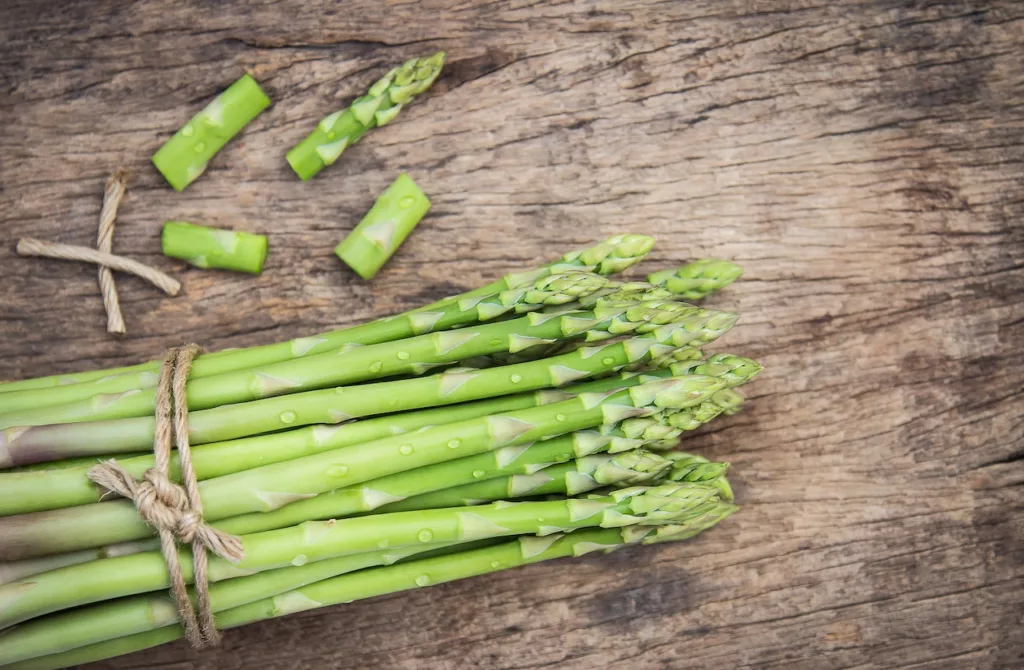Asparagus season will soon return, and those who enjoy, it will eat almost nothing else for the first few days. Sharing healthy snacks with our dogs allows us to bond while also providing them with some variety in their diets. This frequently leads to the question, “Can dogs eat asparagus?” Although asparagus is a healthy food for humans, is it safe to feed it to our pets? Is asparagus good for dogs? Let us investigate!
Table of Contents
You may be interested in : Can dogs eat zucchini? Benefits of zucchini for dogs

Can dogs eat asparagus?
To begin, when we discuss natural foods in dog diets, we are referring to dogs who already receive a natural diet, that is, dogs who receive a homemade meal made with fresh ingredients just for them. We always make an effort to comment on this because people think that industrialized food is a complete and nutritionally balanced food that does not require supplements. As a result, veterinarians do not require pet owners who feed commercial pet food to their pets to supplement their diet with other foods unless they direct them to do so.
Asparagus is a food that is safe for dogs to eat and is not on any list of forbidden foods for dogs. Furthermore, you can include it in a dog’s regular diet because it is a nutritious and low-calorie food. As with most vegetables, the only limitation is quantity. You should give vegetables to dogs in moderation in all cases. So we can safely say that the answer is yes, dogs can eat asparagus, but only in moderation.
It never hurts to repeat that dogs do not have a digestive system as well prepared to digest vegetables as ours. Those who read our articles on natural diets already know that homemade food allows dogs to eat healthier by consuming fresh food without adding artificial substances. Vegetables and including asparagus should represent a minor part of the meal, the main protagonist of each dish will always be protein. Vegetables work as food supplements and help balance meals.
How healthy is asparagus for our dogs?
Very nutritious. It is low in calories and high in vitamins, both of which are beneficial to our dogs. Despite all of the healthy ingredients, you should only give small dogs small amounts of asparagus due to its diuretic effect.
Read also: How long can a dog go without eating?
The benefits that asparagus brings
Here are the top reasons why I believe these wonderful vegetables are beneficial to your dog’s diet.
They are high in fiber.
Asparagus is high in fiber and comes in two varieties. Insoluble fiber bulks up stool, promotes regular bowel movements, and promotes the renewal of the cells lining your dog’s intestines. Soluble fiber, on the other hand, aids the digestive system and boosts immunity by feeding the good bacteria in the colon. Indeed, the soluble fiber found in asparagus is an excellent probiotic that aids in the maintenance of healthy and robust intestinal flora. Asparagus helps your dog’s immune system because it contains 80% of its immune system.
They contain several vitamins
Asparagus contains vitamins A, C, E, K, and B9, which are beneficial to your dog’s health. Let’s look at what they’re for in more detail:
- Vitamin C is a non-essential water-soluble nutrient that your dog’s body can produce on its own. At the same time, your dog needs a natural source of this vitamin because free radicals damage cells, stealing nutrients from other cells and deteriorating DNA. Antioxidant supplementation essentially aids in the control of free radical damage and may help slow the aging process.
- Vitamin A is a fantastic fat-soluble antioxidant. It is essential for your dog’s vision, immune health, and cellular reproduction, as well as healthy skin and bones.
- Vitamin K is fat-soluble and activates the clotting mechanism in the body. Aids in bone metabolism and immune system protection for your dog.
- Vitamin E is a fat-soluble antioxidant that aids in the regulation of oxidation and free radicals in the body. It’s great for your dog’s skin and coat, and it can help him see better.
- Vitamin B9, or folic acid, is one of the “B-complex” of eight water-soluble B vitamins. Cells require B9 for growth, amino acid metabolism, and DNA synthesis. Vitamin B9 works in tandem with vitamin B12 to aid in the formation of methionine.
- Methionine is a necessary amino acid for dogs. It can act as an antioxidant, promote collagen and bone strength, and aid in the production of glutathione, a key antioxidant in the body.
Mineral reserve
Asparagus contains minerals like potassium, copper, calcium, iron, and phosphorus. Let us examine the results:
- Asparagus, like bananas, is a good source of potassium. Potassium is an electrolyte that helps control nerve impulses, brain function, and muscle function in the body.
- Copper aids in the formation of red blood cells as well as the maintenance of nerve cells. It aids in the formation of collagen, bone, and connective tissue.
- Iron, on the other hand, aids in the delivery of oxygen to your dog’s body. The iron protein hemoglobin transports oxygen from the lungs to the rest of the body, while myoglobin transports oxygen to the muscles.
- Phosphorus, like calcium, is a mineral that aids in the formation of bones and teeth. Furthermore, phosphorus acts as a catalyst for bodily functions such as cell growth, maintenance, and repair.
- Calcium is necessary for bone and cartilage development in your dog, but it is also necessary for blood clotting and supports neuromuscular, cardiovascular, immune, and endocrine functions.
The negative aspects of asparagus
Although asparagus contains many nutrients that are necessary for your dog’s health, giving it in excessive amounts or incorrectly can be inconvenient and unhealthy for your dog. To reap the most benefits from asparagus, follow these guidelines:
- Give asparagus in small amounts: Although asparagus is not toxic in small amounts, it can cause digestive upset, excessive urination, and intestinal gas. If your dog is not accustomed to eating asparagus, we suggest introducing it gradually into their diet. Otherwise, you might have a few sleepless nights!
- Help Your Dog Digest Them: Raw asparagus and other vegetables can be difficult for your dog to digest. You can improve their digestibility and palatability by steaming, boiling, or fermenting them before blending. This way, you’ll get the necessary nutrients for your dog’s health.
- Prepare them correctly: As you are aware, you must prepare asparagus properly because it is very woody and hard, and it will be indigestible even for your dog if it is not prepared correctly.We usually cook them until they are tender and soft before eating them. If you feed your dog the entire stalk, he may develop severe indigestion. So, how should you go about preparing them? Before giving them to your dog, there are a few extra steps to take. To avoid suffocation, cut off the rough and fibrous end of the stem and steam it or cook it in salted water until tender, then cut it into small pieces of reduced size.
Can dogs eat raw asparagus?
Raw and cooked asparagus are both delicious and nutritious for both humans and dogs. However, some dogs prefer cooked asparagus to raw asparagus.
You must chop the raw asparagus.
Although raw asparagus is edible and healthy for both humans and dogs, you should cut it into small pieces because it is fibrous and difficult to work with. It can become problematic if your dog does not chew it (some dogs are eating machines and try to eat without chewing). Your dog may simply choke at best, but it may also choke. Green and white asparagus are less problematic when cooked.

Can dogs eat asparagus peel?
Asparagus peel is as unproblematic as asparagus itself. However, because the peel is tough and fibrous, you should cut it into small pieces. However, I would be cautious about asparagus from unknown origins, as every non-organic farmer counts. Because the things that ensure our asparagus grow so well and are left alone by insects (pesticides, fertilizers) like to collect in the bowl. As a result, I no longer make asparagus soup with asparagus peel. And I never give the dog food that I no longer want to eat. Furthermore, a dog is neither a waste bin nor a substitute for compost.
Can dogs eat asparagus soup?
I would not give my dog asparagus soup or cream of asparagus soup because they are so deliciously seasoned. A little dab won’t hurt if your dog is used to human food and spices. If you have a food-sensitive dog who does not eat spicy foods, I would not feed it asparagus soup.
Can dogs eat asparagus out of a jar?
That is also an option. However, because this type of asparagus is very fibrous, asparagus from a jar (or can) should be cut into pieces. However, before feeding the asparagus, please check to see what it was pickled in. Because of the high salt content, you should only feed a small amount of this asparagus.
Read also: Can dogs Eat Pecans?
Conclusion: Can Dogs Eat Asparagus?
When cooked properly, asparagus is a healthy treat to share with our dogs. While raw asparagus is not toxic, it is not recommended because it poses choking hazards and is difficult to digest. Furthermore, the asparagus plant’s non-edible parts are toxic to puppies, so keep them out of your yard!
References: American Kennel Club, Health Benefits of Asparagus, Healthline